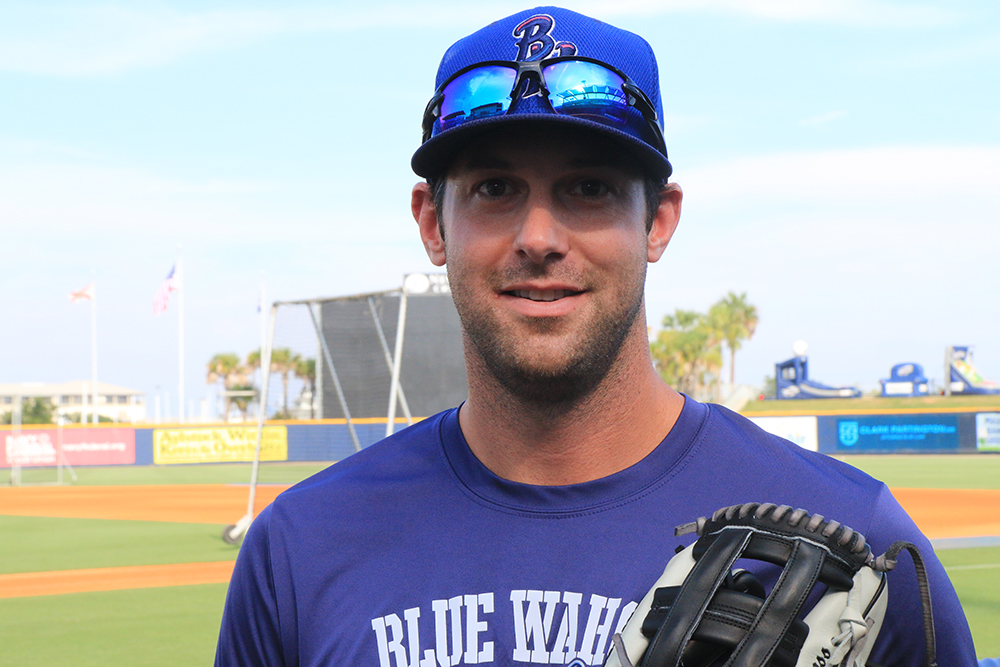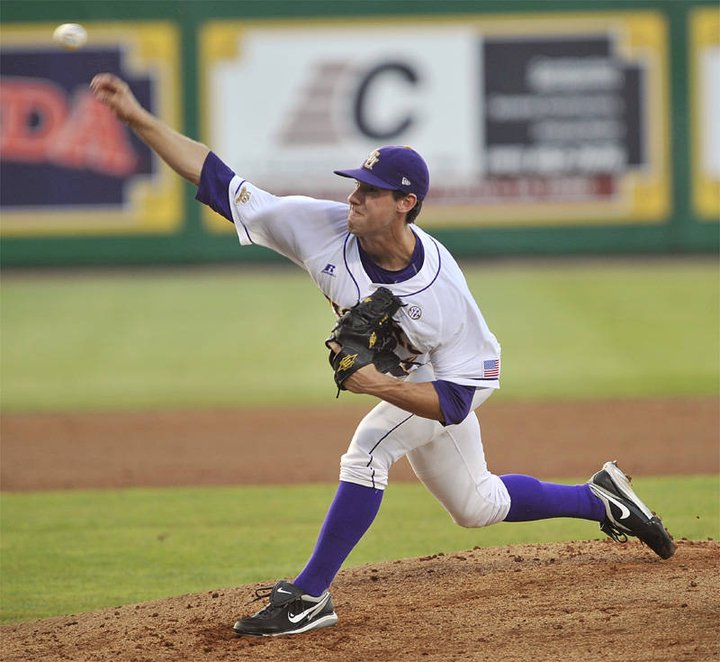“Helena, Montana.”
“Appleton, Wisconsin.”
“Brevard County, Florida”
Slight pause.
“Arizona Summer League, then back to Appleton, Wisconsin.”
“In 2014, I spent most of the year in Brevard County Florida in high A ball, then to double A in Huntsville, Alabama.”
“In 2015, I started in Biloxi and then went to Colorado Springs and was there all 2016.”
“And now I’m here.”
But how he got to Pensacola – and why he’s in Pensacola – are tied to that slight pause. Ross doesn’t say it in so many words, but it’s obvious that if it weren’t for what the slight pause represents, he probably wouldn’t be watching the Blue Wahoos take batting practice. He might be chasing fly balls in the outfield as the Milwaukee Brewers take batting practice.
On April 20, 2012, Ross was pitching in high Class A for Brevard Country against Dunedin when he felt something funny on a slider he threw to a left-handed batter.
“I felt a little twinge, but it didn’t really hurt. I’ve always heard guys say they hear a pop or it feels like a knife stabs them. So I flexed my forearm, then another pitch and got the guy to pop up,” Ross says of that night. “They told me I was done for the night and I told the trainer (about the twinge). He did the strength test on it and I passed that. Saw the doctor the next day and passed that. I tried to play catch the next few days and it just bothered me. We got a MRI a few days later and it was blown all the way through.”
It’s known as ulnar collateral ligament reconstruction, but nobody calls it that. It’s Tommy John surgery, named after a former Major League pitcher who was the first to undergo what was then an experimental surgery in the 1970s, but is now commonplace.
There are plenty of success stories from Tommy John surgery, but no baseball player is exactly standing in line to have it done.
Unless you want to keep chasing that dream.
Austin Ross wasn’t in the mood to give up on his dream in 2012. And, as you’ll find out, he still isn’t ready.
* * *
Even with missing almost a season and a half, Ross had thrown 634 minor league innings. He’s only five months younger than Clayton Kershaw of the Los Angeles Dodgers, who is regarded as the best pitcher in baseball. He’s a year older than Madison Bumgarner, one of the dominant pitchers of this decade. It’s not meant as a comparison but rather as an example of how things can work.
There is no set path to baseball success. Some are high draft picks. Some go straight from high school to professional baseball. Kershaw and Bumgarner have a combined 11 All-Star Games and four World Series appearances. Ross has been a minor league All-Star a few times and appeared in the postseason twice. Meanwhile, dozens of others their age still wait for their chance in the minor leagues.
But Ross is as aware as anyone that his time is running out. He was the oldest player on the 2017 Pensacola team. He was almost four years older than the average Class AA player.
Frustrating? Sure. But there’s a reason why and it all goes back to April 20, 2012. The arm injury he suffered that night came at the worst possible time in his career.
Typically, college pitchers get drafted in June, sign and report for a half season, all in the same summer. Then they come back for a full year to get prepared for a career that will take them either up or out.
When Ross was assigned to Brevard Country for his second full year, the high Class A level was just about right for the former eighth round pick from one of the top college programs in the country.
Ross says his career has “been good, for the most part.” But he knows the detour he was forced to take changed everything. “The biggest issue is that I got hurt at about the time that guys career take off, especially college guys,” he said. “It’s usually that second or third full season and I basically missed both those years.”
Steve Cline, Ross’ pitching coach in the Arizona Summer League and a former player and coach for the Shreveport Captains said, “You expect college players to move a little faster than high school kids. In the second year, you expect them to move (up). For him to come up with the injury at that point was bad timing.”
“This was my seventh year playing,” Ross said, “but it doesn’t feel that long because I really didn’t start playing until 2014.”
But just getting to 2014 wasn’t easy. After the surgery, Ross was sent to Arizona to begin the rehabilitation process. Prospects don’t even pick up a baseball for 16 to 18 weeks. They usually go through physical therapy and a variety of exercises designed to get them back on the road as soon as possible.
A lot of times, the player’s timetable isn’t the same as the team’s timetable.
“Once you get to the throwing part of it, it’s a pretty integral program,” Cline says. “You have a number of throws and a certain distance and then you complete that and go to another distance. It can get mundane, very repetitive and very routine. Sometimes you plateau a little bit and it can be challenging. You don’t want to lose them because they are putting in all that work. You have some deep conversations with them.”
Eventually, there is live batting practice and even when they do get into a game, it’s usually only for an inning or 25 pitches.
Cline says Ross could not have been a better “student” in staying with the process. “One thing I remember from being around him is that he was very disciplined and was able to accomplish each step with how he did his work, get himself healthy and get better and back on the mound,” he said. “He was always very detail oriented. He might have overanalyzed things sometimes, but that was just him. But he was wanting to get out there and compete and continue his career.”
In the case of Ross, the timing allowed him to get back to the minor leagues toward the end of 2013 and made a combined 16 starts between the Rookie League (Arizona) and Wisconsin (lower Class A).
“You want to give them the opportunity to pitch that second summer,” Cline says. “Then they can go home, have a winter when they can regroup a little bit and be healthy so they can come back for spring training.”
Ross did just that, but his career has been a series of minor league stops ever since.
* * *
He made it to double-A Huntsville in 2014 and then went from AA to Class AAA Colorado Springs, one of the toughest places to pitch in all of baseball, in 2015 and 2016. In his full season in Colorado Springs, he was 6-2 with a 3.89 ERA, mostly as a reliever.
“If you are pitching well in double A, you can pitch well in triple A,” Ross says. “I’m not going to ‘out stuff’ anyone, but if you really know how to pitch, you kinda have some guys beat before they ever get in the box in double A. In triple A, batters already have big-league time or have lots and lots of at-bats or they are super talented.”
The best – and the worst – thing about being in Class AAA is that you are one phone call away from realizing the dream you’ve waited for your whole life.
“It’s obviously in your mind, because that’s why you play,” Ross says. “I’m not here to play minor league baseball. I want to compete against the best competition. It’s hard not to think about it sometimes, when you see other guys getting called up who you feel like you are better than.
“The longer you are in it, the more you realize how much of a business it is,” he continued. “There are a lot of guys in the big leagues who could be career minor leaguers and vice versa. You just have to take care of your business and hope something works out for you.”
Ross has been used both as a starter and a reliever. He just keeps pitching in whatever role is asked of him. When he came back from his injury, he was 25 years old and the last guy in the bullpen. Last year in Pensacola, he was 9-0 and one of the best pitchers in the entire Southern League. “Even when I’m in the bullpen, I think like I’m a starter,” Ross said. “I use all my pitches and I throw inside a lot. It doesn’t really matter to me, but I always think like a starter.”
After the 2016 season, Ross elected to become a free agent, leaving the Milwaukee organization that drafted him for a new start with Cincinnati.
“I was excited for it. It can be hard to find a job if you don’t throw 98 or hit a bunch on homers,” he says. “So I really didn’t know what to expect. I knew I had come off a really good year at Colorado Springs. When you are a 28-year old right hander who throws 91 (mph), you’re not super appealing to people no matter how well you can pitch.”
Once again, he spent time in triple A (Louisville) – one phone call away — but the majority of the season was spent in Class AA Pensacola. He was dominant: 9-0 with a 1.87 ERA.
“There were times in 2016 that I could have, or should have, been called up (to the major leagues),” Ross says. “Everyone would have viewed it as (an) earned (promotion). But that’s baseball. You have to be in the right place at the right time.”
* * *
For better or worse, it’s been eight seasons of professional baseball, so Austin Ross is allowed to be reflective of where his career has taken him.
“Yeah, I would have taken this career. I don’t know that I would have taken being in double A at age 28, or expected to get hurt and missed two years,” Ross said. “But I had a great experience at LSU and I wouldn’t trade that for anything. I’ve had a lot of fun in pro ball, but I don’t feel like I’ve played a lot of baseball.”
It’s baseball, so nobody’s future is certain. “I’ve obviously thought about that because I’m a little bit older now,” he said. “If I was struggling or haven’t pitched as well as in the past, it might be easier to say I’m done and it’s time to go do something else. It would be too hard to stop playing now; knowing that I’m throwing it as well as I have ever thrown it.”
As a junior at Captain Shreve, Ross was the winning pitcher for the Gators as they won the Class 4A state title. As a senior, he was the Louisiana Coaches Class 4A Pitcher of the Year.
“What he did was everything we asked of him and more,” said Ronnie Coker, his coach at Captain Shreve. “Every time he went out there, we knew we would get his best. He always took care of his business, on and off the field. Austin is one of those kids every coach should have during his career.”
From there, it was a three-year career at LSU, but Ross said there’s not much of a change from the player who showed up from LSU in the 2010 draft.
“I think I’ve always been a strike-thrower,” Ross says. “I might get hit, but I’m going to go after guys. I’ve learned who I am as a pitcher, especially after I got hurt. That’s what’s kept me playing. I know I can pitch in the big leagues and I know I can have success in the big leagues.”
* * *
At the end of the 2017 season, the Cincinnati Reds called up a right-handed pitcher from Class AA Pensacola. He was a 28-year old who had won nine games that season for the Blue Wahoos. A former high draft pick who had bounced around between stops throughout the minor leagues for a long time.
At long last, that phone call finally came.
To a player named Deck McGuire.
EPILOGUE
“In reality, I was hurt all last year,” Ross said. “All last year, all I really did was just get through it. I figured I’d have a normal off-season, get healthy and I’ll be ready to go. I was so excited about 2018.”
In November, Austin Ross became a free agent. A month later, he signed a contract with the Arizona Diamondbacks for the 2018 season.
He began his off-season throwing program around Christmas, but things just didn’t seem right. “My shoulder was hurting,” Ross said. “That was too much pain after being off.”
He had an MRI and it confirmed the bad news. Ross had a rotator cuff tear, a partial tear of his labrum and torn capsule of the shoulder. That can take years, not months, to recover.
“I had kind of made up my mind,” Ross said. “The MRI was the validation I needed.”
So he called the Diamondbacks with the news. Austin Ross was done with baseball.
“I’m glad there is no gray area,” he said. “I physically can’t do it anymore. The way I look at it, it’s kind of a blessing.”
He is enrolled at LSU and is a semester away from receiving his degree in petroleum engineering.
“I’m 29 and I really don’t feel like doing homework,” he said. “But I’ll graduate and see where it takes me.”
So the phone call never came. The one all minor league players dream will come their way one day.
But during the off-season, Ross found out that he had indeed been in line for a call up during the regular season (not a September call up). He was told that there were “daily conversations” in the Reds front office about bringing him up to the major leagues and that the organization was “leaning toward” the call up.
That close.
That far away.


